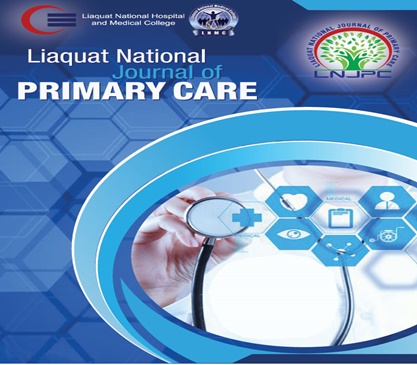Original Article
Association of Thyroid Dysfunction with Unexplained Infertility in Women of Karachi Pakistan
Abstract
-
Background: Thyroid autoimmunity and thyroid dysfunction is predominant in women of procreative age and has been linked with hostile fertility.
-
Objective: To evaluate the association of thyroid dysfunction with unexplained infertility (UI)
-
Material and Methods: A case-control study was performed by the department of Physiology Basic Medical Sciences Institute in collaboration with Jinnah Postgraduate Medical Centre, Karachi from May 2018 to June 2019. A sample size of 88 subjects; Group A (44 healthy fertile controls) and Group B (44 UI women) was calculated. Study variables included height, weight, body mass index, serum Triiodothyronine (T3), Thyroxine (T4), Thyroid-stimulating Hormone (TSH), Thyroid Binding Globulin (TBG), and Anti-thyroid peroxidase antibody (Anti -TPO).
-
Results: UI females had high TSH concentration without any disturbance in T3 and T4 in comparison with controls, 40% of women with UI had TSH levels higher than 2.5 mIU/L as compared to 4% in controls. The mean TSH was 2.47±1.97mIU/L in UI females as compared to 1.10±2.14 mIU/L in controls. Both logistic regression models adjusted for age and body mass index showed that fertile controls were significantly less likely to be found with higher TSH (aOR=0.71, 95% CI: 0.52-0.98, p=0.040) and TBG (aOR=088, 95% CI: 0.81-0.95, p=0.002) as compared to females with UI.
-
Conclusion: Minimal deviation of TSH (increased), raised anti-thyroid antibodies with slightly low T3 and T4 levels was observed in UI females. Mild variations in TSH within the normal range may contribute to some cases of UI therefore a direct need for thyroid profile assessment in all infertile females is recommended.
- Keywords: Unexplained Infertility, Thyroid dysfunction, Triiodothyronine, Thyroxine, Antithyroid Peroxidase antibody.
Back to All Articles

